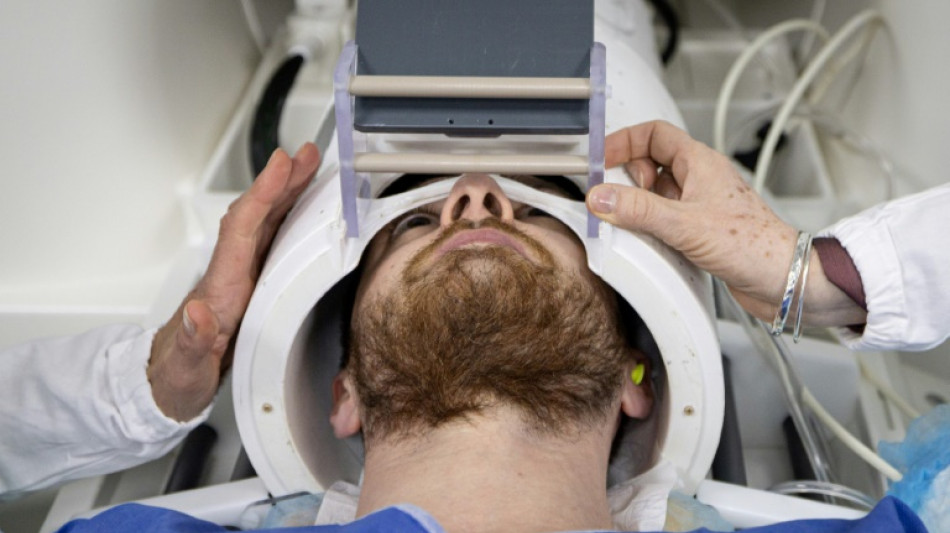
-
 Germany's far-right AfD holds march after Christmas market attack
Germany's far-right AfD holds march after Christmas market attack
-
European, US markets wobble awaiting Santa rally

-
 Serie A basement club Monza fire coach Nesta
Serie A basement club Monza fire coach Nesta
-
Mozambique top court confirms ruling party disputed win

-
 Biden commutes almost all federal death sentences
Biden commutes almost all federal death sentences
-
Syrian medics say were coerced into false chemical attack testimony

-
 NASA solar probe to make its closest ever pass of Sun
NASA solar probe to make its closest ever pass of Sun
-
France's new government to be announced Monday evening: Elysee

-
 London toy 'shop' window where nothing is for sale
London toy 'shop' window where nothing is for sale
-
Volkswagen boss hails cost-cutting deal but shares fall

-
 Accused killer of US insurance CEO pleads not guilty to 'terrorist' murder
Accused killer of US insurance CEO pleads not guilty to 'terrorist' murder
-
Global stock markets mostly higher

-
 Not for sale. Greenland shrugs off Trump's new push
Not for sale. Greenland shrugs off Trump's new push
-
Sweden says China blocked prosecutors' probe of ship linked to cut cables

-
 Acid complicates search after deadly Brazil bridge collapse
Acid complicates search after deadly Brazil bridge collapse
-
Norwegian Haugan dazzles in men's World Cup slalom win

-
 Arsenal's Saka out for 'many weeks' with hamstring injury
Arsenal's Saka out for 'many weeks' with hamstring injury
-
Mali singer Traore child custody case postponed

-
 France mourns Mayotte victims amid uncertainy over government
France mourns Mayotte victims amid uncertainy over government
-
UK economy stagnant in third quarter in fresh setback

-
 Sweden says China denied request for prosecutors to probe ship linked to cut undersea cables
Sweden says China denied request for prosecutors to probe ship linked to cut undersea cables
-
African players in Europe: Salah leads Golden Boot race after brace

-
 Global stock markets edge higher as US inflation eases rate fears
Global stock markets edge higher as US inflation eases rate fears
-
German far-right AfD to march in city hit by Christmas market attack

-
 Ireland centre Henshaw signs IRFU contract extension
Ireland centre Henshaw signs IRFU contract extension
-
Bangladesh launches $5bn graft probe into Hasina's family

-
 US probes China chip industry on 'anticompetitive' concerns
US probes China chip industry on 'anticompetitive' concerns
-
Biden commutes sentences for 37 of 40 federal death row inmates

-
 Clock ticks down on France government nomination
Clock ticks down on France government nomination
-
'Devastated' Australian tennis star Purcell provisionally suspended for doping

-
 Mozambique on edge as judges rule on disputed election
Mozambique on edge as judges rule on disputed election
-
Mobile cinema brings Tunisians big screen experience

-
 Philippines says to acquire US Typhon missile system
Philippines says to acquire US Typhon missile system
-
Honda and Nissan to launch merger talks

-
 Police arrest suspect who set woman on fire in New York subway
Police arrest suspect who set woman on fire in New York subway
-
China vows 'cooperation' over ship linked to severed Baltic Sea cables

-
 Australian tennis star Purcell provisionally suspended for doping
Australian tennis star Purcell provisionally suspended for doping
-
Asian markets track Wall St rally as US inflation eases rate fears

-
 Luxury Western goods line Russian stores, three years into sanctions
Luxury Western goods line Russian stores, three years into sanctions
-
Wallace and Gromit return with comic warning about AI dystopia

-
 Philippine military says will acquire US Typhon missile system
Philippine military says will acquire US Typhon missile system
-
Afghan bread, the humble centrepiece of every meal

-
 Honda and Nissan expected to begin merger talks
Honda and Nissan expected to begin merger talks
-
'Draconian' Vietnam internet law heightens free speech fears

-
 Israeli women mobilise against ultra-Orthodox military exemptions
Israeli women mobilise against ultra-Orthodox military exemptions
-
Asian markets track Wall St rally as US inflation eases rate worries

-
 Tens of thousands protest in Serbian capital over fatal train station accident
Tens of thousands protest in Serbian capital over fatal train station accident
-
Trump vows to 'stop transgender lunacy' as a top priority

-
 Daniels throws five TDs as Commanders down Eagles, Lions and Vikings win
Daniels throws five TDs as Commanders down Eagles, Lions and Vikings win
-
'Who's next?': Misinformation and online threats after US CEO slaying


Low-cost MRI paired with AI produces high-quality results
A magnetic resonance imaging device built with off-the-shelf parts and paired with AI matched the performance of high-end MRI machines, according to a study published Thursday that could pave the way for greater access to the life-saving tools.
First introduced five decades ago, MRI scanners are now a cornerstone of modern medicine, vital for diagnosing a wide range of conditions -- including strokes, tumors, and spinal conditions -- while avoiding exposing patients to radiation.
But they remain hard to come by in developing countries: Africa has less than one MRI machine per million people, while the figures in the United States and Japan are 40 and 55 per million, respectively.
To tackle the problem, Yujiao Zhao and colleagues at the University of Hong Kong built a simplified, low-powered MRI machine using store-bought hardware that cost around $22,000, and published their findings in the prestigious journal Science.
MRI uses a strong magnetic field and radio waves to align and manipulate the body's hydrogen atoms, producing detailed images of internal structures and organs.
The strength of magnets is measured in units called teslas (T), with conventional MRIs requiring powerful electromagnets that have wires bathed in supercooled liquid helium to generate magnetic fields of 1.5T to 7T.
These machines demand high electricity inputs, far exceeding what standard wall outlets can provide, and must be housed in radio frequency-shielded rooms to prevent equipment interference. Current clinical use MRIs cost upwards of million dollars.
By contrast, the Hong Kong research team's full body MRI machine used a helium-free 0.05T magnet and required just 1800 watts -- comparable to a hair dryer, meaning it could use a standard socket. What's more, it did not require radio shielding.
To compensate for the reduced image detail and higher levels of radio interference, the researchers integrated their system with a deep learning algorithm trained on a vast dataset of high-resolution images of human anatomical structures.
They then tested their machine on 30 healthy adult volunteers, performing scans over their bodies from their brains down to their knees.
The results from their so-called "ultra low field" MRI were found to be on par with conventional MRI scanners 60 times more powerful.
"These advances pave the way for affordable, patient centric, and deep learning–powered ULF MRI scanners, addressing unmet clinical needs in diverse healthcare settings worldwide," Zhao and colleagues wrote.
In an accompanying comment piece, researchers Udunna Anazodo and Stefan du Plessis wrote the approach was "promising" but added several challenges needed to be addressed before it can be widely applied.
"Concerted effort must be taken to develop the skills needed to ensure local production and maintenance of these devices and their proper use," in countries with low resources, they said. Radiologists would also need to be retrained to appropriately interpret the images.
F.Dubois--AMWN



